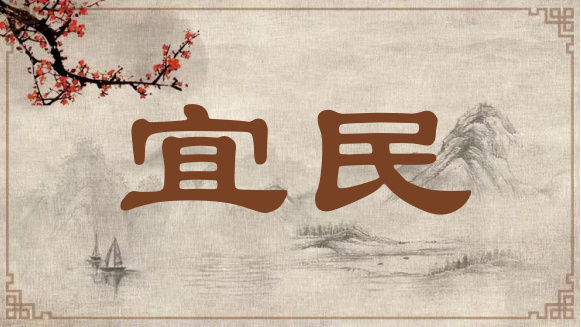宜民
Nurture a Sense of Contentment Among the People

使百姓适宜、安宜。中国古人认为,这是国家制度设计、政策制定、治国理政所必须遵循的根本原则。在中国传统政治话语中,“天”是主宰,“君”是手段,“民”是目的;“天”与“民”的关系,可以概括为“天随人愿”,即《尚书》所谓“民之所欲,天必从之。”如果说“安民”是治国理政者的基本职责和主要目标,那么“宜民”则是履行此职责、实现此目标的行动指针和过程规范。其精髓在于,一切以民众适宜为标准,执政者不得将自己的主观意志强加于民。
Striving for a society where people are content and in comfort was a foundational principle that the ancient Chinese believed essential to guide the design of state systems, policy formulation, and the governance of a nation. Upholding this precept was considered pivotal for leaders wanting to receive the protective support of tian (天 heaven) — a traditional concept of Chinese governance where tian presides, the ruler mediates, and the people are the central focus. This dynamic is encapsulated in the idea that tian aligns with the will of the people, as depicted in The Book of History, "What the people desire, tian will surely give effect to." The core responsibility and goal of a leader is to ensure the peace and stability of the people. Yet, going beyond that, nurturing a sense of contentment among the people provides a compass — guiding the path towards fulfilling these responsibilities. This principle guides leaders to prioritize the comfort and needs of the people, while carefully avoiding the imposition of their personal desires on the populace.
引例 Citations:
◎《诗》云:“宜民宜人,受禄于天。”为政而宜于民者,固当受禄于天。(《汉书·董仲舒传》)
《诗经》说:“适合于民,适合于人,接受上天给予的福禄。”执政能适合人民,自然会得到上天给予的福禄。
As written in The Book of Songs, "By bringing contentment to the people, he shall be blessed by tian." Those who govern in ways that nurture contentment among the people will naturally receive blessings from the natural order of tian. (The History of the Han Dynasty)
◎王者制礼作乐,道在宜民。(吴广成《西夏书事》卷十二)
推行王道的君主创制礼乐制度,其根本原则在于使百姓安宁。
Rulers who conduct the benevolent governance craft rituals and create music, with the fundamental principle of bringing a sense of contentment to the people. (Wu Guangcheng: The Affairs of the Western Xia Dynasty)
推荐:教育部 国家语委
供稿:北京外国语大学 外语教学与研究出版社
责任编辑:钱耐安





